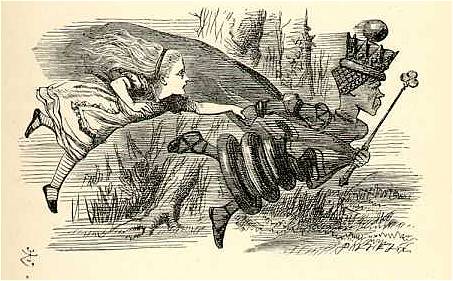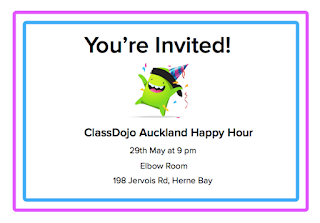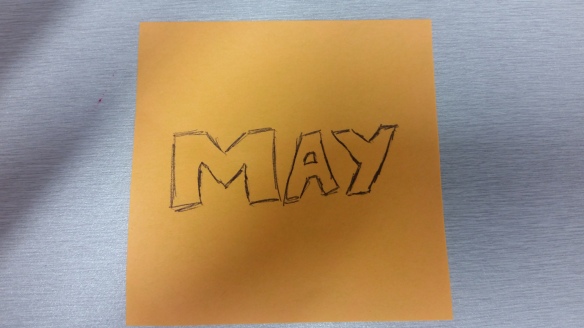Sign up here to keep in the loop about updates...
Sunday, 19 July 2015
Tuesday, 9 June 2015
Friday, 29 May 2015
ClassDojo is in town!
Kleine, former teacher now Community Lead at ClassDojo, is visiting Auckland - all the way from San Francisco! She has invited everyone to join her and the New Zealand Community Team for a night of drinks and socializing at Elbow Room, in Herne Bay. First round of drinks are on ClassDojo! So come join us for a drink or two with inspiring educators - and feel free to bring your colleagues, friends, or significant others along, too. This is ClassDojo's way of saying 'thank you' for all of the hard work you are doing in the classroom.
Make sure to RSVP for the event here, https://www.eventbrite.com/e/classdojo-auckland-happy-hour-tickets-16791472747
Need to connect with Jenna beforehand? Shoot her an email at jenna@classdojo.com or tweet her at @jenna_kleine
Cheers!
Thursday, 30 April 2015
Launching #edsketch !
This May, we would like to encourage everyone to take part in a challenge. The challenge is to share a sketch every day in May. We can all track each other by using #edsketch15 on our shares (whether it be on twitter, Google+, Instagram or whatever social media you utilise). Inspired by Austin Kleon's Show Your Work, we would like to encourage everyone to sketch something they have been reading, thinking about, trying out, observing, questioning, exploring, reflecting on, working on that day.
Sunday, 26 April 2015
Left behind.
Today I want to comment on those people in our schools, even whole schools, that are being left behind. Chances are that by blogging about this, I am preaching to the converted. However dear converted, if you agree with what I say here, consider printing a copy and leaving it strewn across the staff room, in someone's (or everyone's) pigeon hole or wrapped in a bow with a chocolate attached on a someone's desk.
The last 15 years has seen the introduction of NCEA, a new curriculum and national standards in New Zealand. As well as this, there has been more schools that have introduced bring your own device and other technology related changes including email taking on a central role in teacher's lives. We have also seen the introduction of more and more modern learning environments and the arrival of MOOCs (massive open online courses, often free courses that allow anyone from any part of the world free/cheap access to courses from Stanford, Harvard, Oxford, Yale and more). There is no question about it, change is non stop (for more about this read my post about the role of 'change' in the future of education). For some, all these changes might feel like a passing fad, and that there is no need for them to invest too much time or energy into considering the effect of these. There is however one change that I hope that fewer educators might stop ignoring, the increasing need to be connected. Let me explain.
- Being a connected educator means that you are part of learning conversations with those inside and outside of your organisation. Or as the study by Forte et al. puts it ".... through Twitter, teachers forge and maintain professional ties outside their local schools and, in doing so, become conduits for new practices and ideas to move in and out of their local communities ... teachers are using Twitter as a place to share resources and to make and respond to others’ requests for information." Hence, if you are not part of these conversations, it is likely that you are missing out on the distribution of effort that happens through being connected. It means you are less likely to know about international trends and influences that are or should be impacting the day to day in your classroom and school.
- As well as not being part of the sharing, curating, discussion that happens when you are connected, it is likely that you are relying on those people in your office or your school to challenge and develop you as a professional. Chances are that you are stuck in an echo chamber, rarely having your views challenged by those outside of your organisation. Chances are, your whole organisation might be stuck in an echo chamber, reinforcing its own misconceptions. Chances are, that you are in a bubble, unaware of how the world outside education has fundamentally shifted, unaware that the job market, the value of a university degree, society, has changed more than any one person can possibly hope to know. Examining change in today's world is like "when we try to pick out anything by itself, we find it hitched to everything else".
- Chances are, that if you are not connected, you are likely to fall behind in both the conversations that discuss and consider new practices and ideas, but also that you are likely to constantly feel the agitation and stress from always being reactive, always being on the back foot. It is Lewis Caroll's Red Queen in education, you have to keep running just to keep up. When you stop running, you are left behind.
 |
If you want to get somewhere else, you must run at least twice as fast as that!" - Lewis Caroll
|
You see, being a connected educator is absolutely critical.
If you are not yet connected. Make sure you join your country's education Twitter chat. Join the great Google+ communities, attend the range of free EdCamps on offer across the world. Whatever you do, get connected. If you are in New Zealand, join #edchatNZ (see www.edchatNZ.com) and the range of other great Twitter chats we have. Join the Pond. Educate yourself dear educator about what it means living successfully in a connected society, leveraging the network for your and your colleague's benefit.
References
Daly, A. J. (2010). Social Network Theory and Educational Change. Harvard Education Press. 8 Story Street First Floor, Cambridge, MA 02138.
Forte, A., Humphreys, M., & Park, T. H. (2012, June). Grassroots Professional Development: How Teachers Use Twitter. In ICWSM.
Snyder, S. (2013). The simple, the complicated, and the complex: educational reform through the lens of complexity theory.
Claxton, G. (2013). What's the point of school?: Rediscovering the heart of education. Oneworld Publications.
Cross post from @MissDtheTeacher's blog.
Cross post from @MissDtheTeacher's blog.
Subscribe to:
Posts (Atom)



